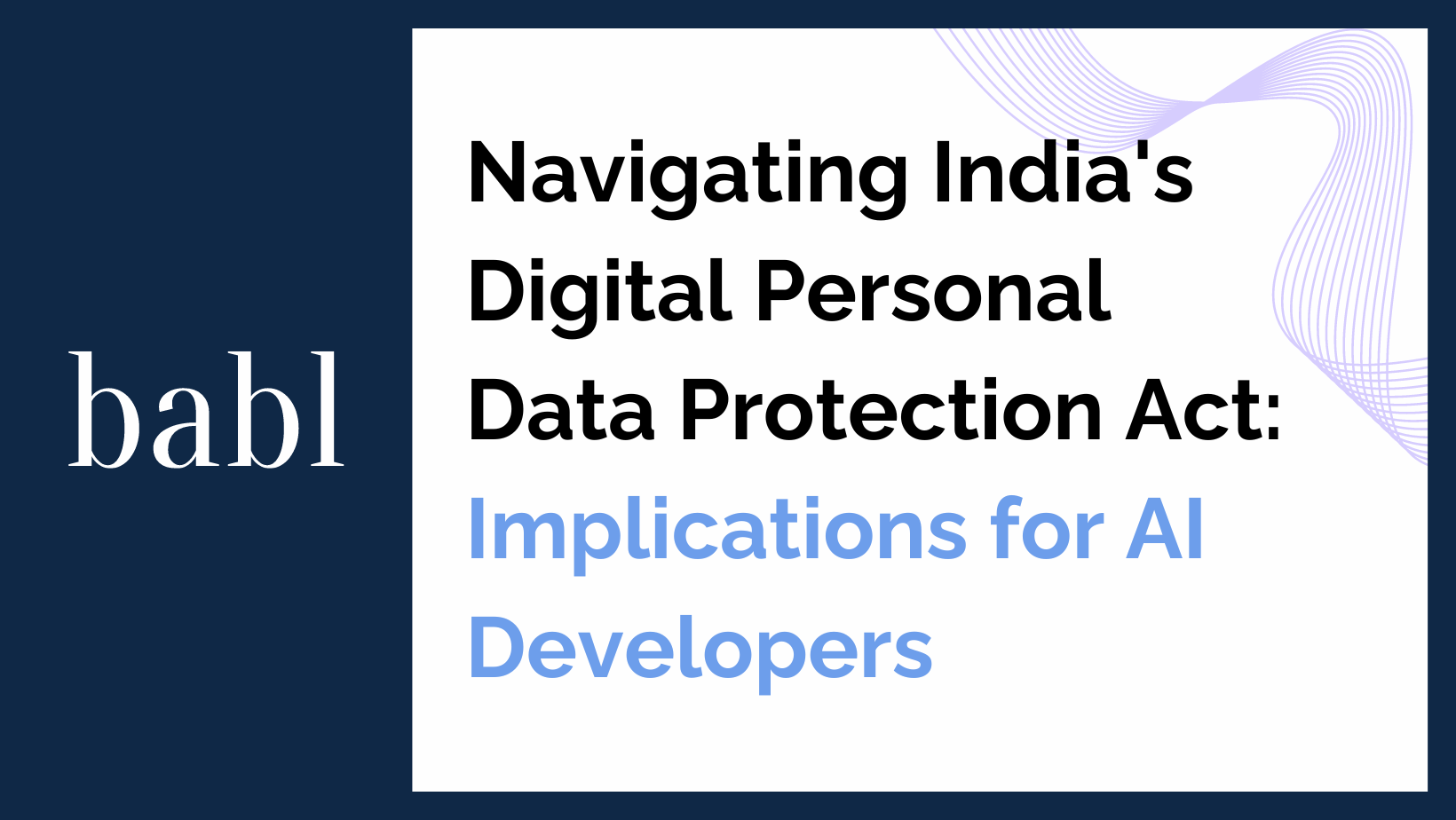Navigating India’s Digital Personal Data Protection Act: Implications for AI Developers
In August 2023, India enacted the Digital Personal Data Protection Act (DPDPA), marking a significant step in the country’s journey towards comprehensive data privacy regulation. This legislation, while building on India’s national strategy, imposes strict obligations on entities termed as “data fiduciaries,” including AI developers. These regulations are designed to ensure that the personal data of Indian citizens is handled with the utmost care, transparency, and accountability.
Understanding the Digital Personal Data Protection Act
The DPDPA 2023 sets out clear guidelines for the processing of digital personal data, emphasizing the need to balance individual privacy rights with lawful data processing requirements. It defines several crucial terms and establishes a framework for data fiduciaries, data principals (individuals whose data is being processed), and data processors.
Key Definitions and Roles:
- Data Fiduciary: Any entity that determines the purpose and means of processing personal data. This includes AI developers who collect, analyze, and utilize personal data.
- Data Principal: The individual to whom the personal data relates.
- Data Processor: An entity that processes data on behalf of a data fiduciary.
The Act mandates that data fiduciaries adhere to several obligations to protect the privacy and data rights of individuals.
Key Provisions Impacting AI Developers
- Lawful Processing of Data: AI developers can process data only for lawful purposes with the data principal’s consent or under specific legitimate grounds defined in the Act. They must obtain explicit and informed consent before using personal data.
- Consent Management: Consent must be clear, specific, and revocable. Developers must explain how data will be used and provide simple tools to allow users to withdraw consent at any time.
- Data Protection Obligations: Significant data fiduciaries—such as large AI firms—must appoint a Data Protection Officer (DPO), perform Data Protection Impact Assessments (DPIAs), and undergo regular audits. These steps ensure accountability and ongoing compliance.
- Data Breach Notification: If a breach occurs, developers must immediately notify both the Data Protection Board of India and affected individuals. Swift reporting promotes transparency and limits harm.
- Rights of Data Principals: The Act gives individuals several rights: access, correction, erasure, and grievance redressal. Developers must establish processes to honor these rights efficiently and transparently.
Implications for AI Developers
The DPDPA significantly reshapes how AI developers must handle data. It brings both challenges and opportunities for responsible innovation.
- Enhanced Accountability:Developers must build strong data governance frameworks and keep detailed records of all processing activities.
- Transparency and Consent:Developers need to explain data use clearly and give individuals meaningful control over their data.
- Security Measures:The Act requires strong technical and organizational safeguards, such as encryption, access controls, and security audits.
- Data Minimization:AI systems should collect only what is essential. Minimizing storage time reduces exposure to breaches and strengthens compliance.
- Handling Breaches: Every developer must maintain a response plan for breach notifications and mitigation.
- Grievance Redressal:Companies must create accessible complaint channels for users, fostering trust and legal alignment.
Strategies for Compliance
AI developers can manage these obligations by adopting several proactive strategies:
- Implement Comprehensive Data Governance: Build a unified framework of policies and procedures to manage privacy and security in line with DPDPA standards.
- Conduct Regular Training: Educate all employees—especially engineers and analysts—about DPDPA requirements and responsible data use.
- Leverage Technology: Use tools for automated consent management, data mapping, and breach detection to maintain continuous compliance.
- Engage Legal Experts:Seek advice from lawyers specializing in data protection to interpret complex provisions and ensure compliance readiness.
- Establish Clear Data Policies: Write transparent policies outlining how personal data is collected, processed, stored, and deleted. Make these policies easy for users to find.
- Monitor Regulatory Changes: Stay informed as India’s data protection ecosystem evolves. Continuous monitoring ensures your compliance strategies stay current.
A New Era for AI and Data Privacy
The Digital Personal Data Protection Act 2023 marks a turning point in India’s approach to data privacy. It places substantial responsibility on AI developers to ensure data is managed ethically and securely. Although compliance requires effort, it also helps build trust with users and competitive advantage in global markets. By understanding the DPDPA’s key provisions and implementing strong compliance measures, AI developers can operate responsibly while supporting India’s growing digital economy.
Need Help?
If you have questions about how to navigate the global AI regulatory landscape, contact BABL AI. Their Audit Experts can help your organization interpret privacy laws like India’s DPDPA and ensure full compliance.





